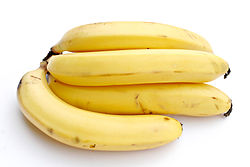Healthy eating habits/Nutrition to Optimise Endurance Cycling Performance
Why is nutrition essential for endurance cyclng?
[edit | edit source]- To boost your energy levels
- For effective recovery
The aim for all riders is to start the ride with fully replenished muscle fuel stores – also known as “glycogen stores”. Having your usual carbohydrate intake as well as resting (or performing light training) 24-36 hours before the ride and eating the appropriate pre-event meal will allow you to achieve this.
To get the most out of this document, click on the provided links to external sources for further information.
Energy Yielding Nutrients
[edit | edit source]|
There are three main nutrients, known as 'macronutrients' that provide the body with energy:
|
Glycaemic Index (GI)
[edit | edit source]|
Glycaemic Index (GI)refers to how quickly carbohydrates are broken down into glucose - the fuel that muscles burn when they are working.
|
Pre-ride Meal/Snacks
[edit | edit source]Snacks During the Ride
[edit | edit source]
Post-ride Meal
[edit | edit source]
 Recovery is most effective when foods that provide a balance of carbohydrates, protein, vitamins + minerals are consumed immediately after, so that your body’s muscle energy stores are replenished for your next cycling session! Multi-stage Events Events that take place over multiple days place a large amount of stress on fuel and fluid reserves. It is critical to replenish these reserves after/between each ride to ensure you have enough energy to complete the event!
|
Carbohydrates & Glycogen (Energy) Stores
[edit | edit source]|
After exercise, glycogen stores (the muscle’s energy source) are fully restored on a high carbohydrate diet. Low carbohydrate diets do not fully replenish glycogen stores; instead they continue to decrease after each exercise session leaving the cyclist with little energy. Therefore, it is very important to have a diet high in carbohydrates to provide the muscles with plenty of energy to cycle long distances without burning out! |
For further information or to seek professional advice from an accredited practicing sports dietitian visit: http://www.sportsdietitians.com.au/findasportsdietitian
References
[edit | edit source]References
- Australian Sports Nutrition. (2014). Sport and Endurance Training. Retrieved from http://www.australiansportsnutrition.com.au/endurance/.
- AIS Sports Nutrition. (2009). Road Cycling. Retrieved from http://www.ausport.gov.au/ais/nutrition/factsheets/sports/road_cycling.
- Iowa University. (2014). Carbohydrate. Retrieved from http://www.extension.iastate.edu/humansciences/content/carbohydrate.
- Medicine Plus. (2014).Carbohydrates. Retrieved from http://www.nlm.nih.gov/medlineplus/ency/article/002469.htm
- Sports Dietitians Australia. (2009). The Glycaemic Index and Sports Performance. Retrieved from http://www.sportsdietitians.com.au/resources/upload/GI_and_sports_performance.pdf




